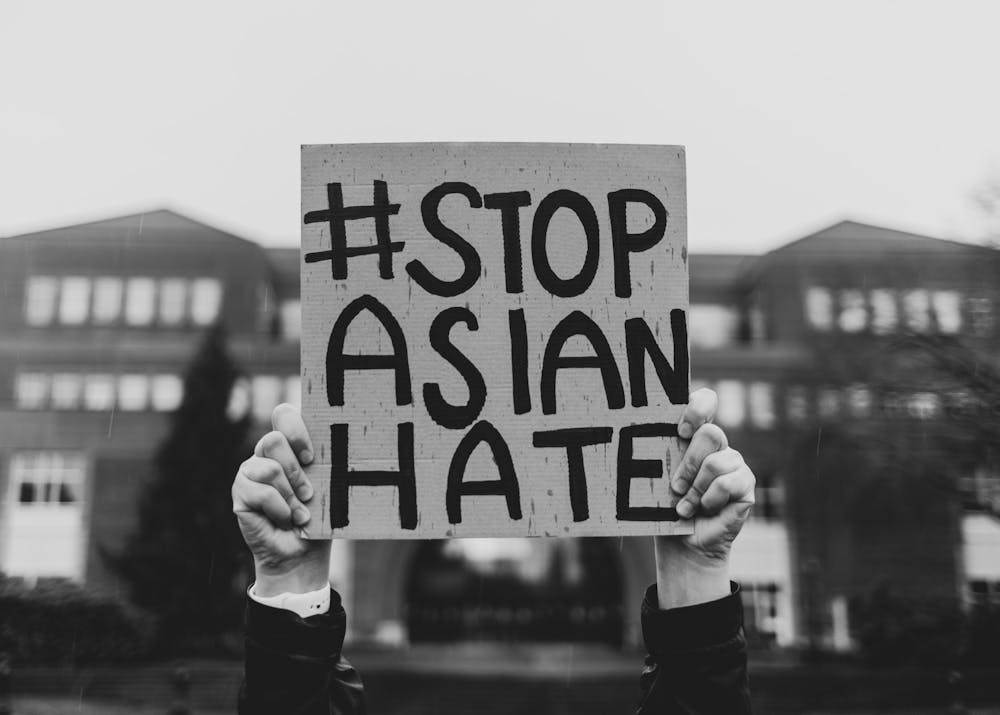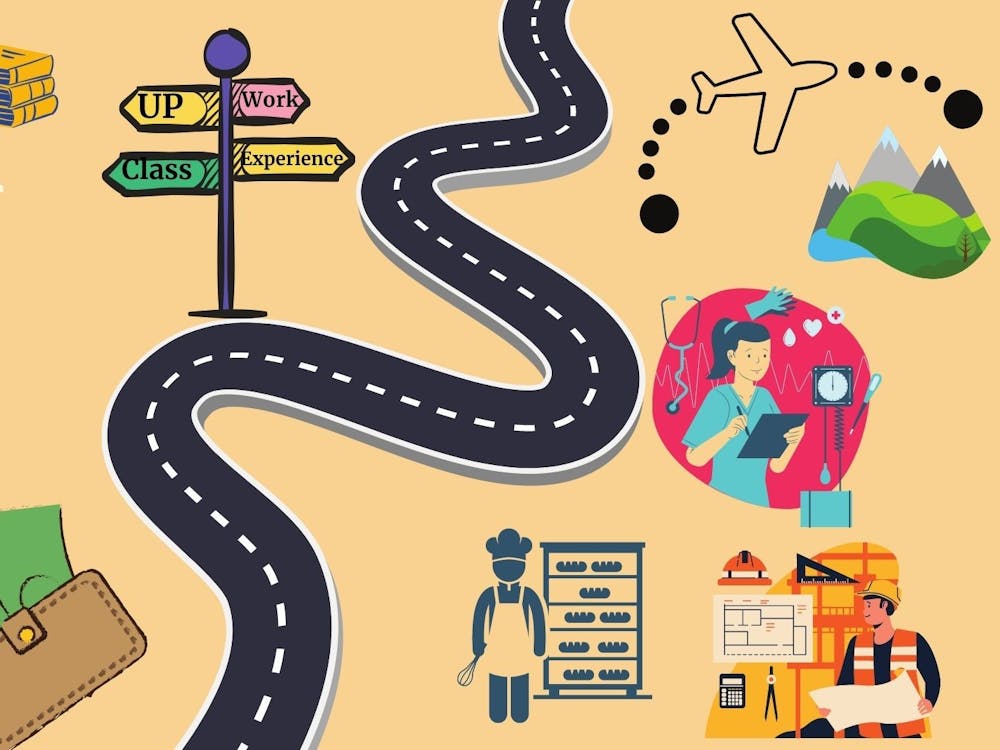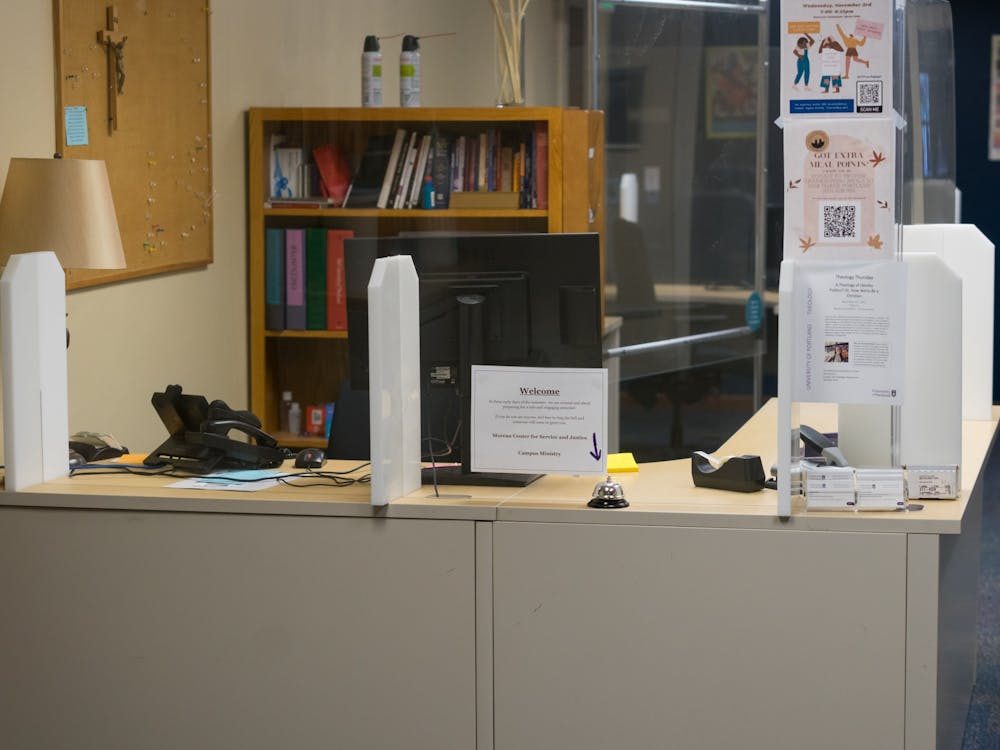As juniors Olivia Nomura and Bao Huynh watched Wong’s King, one of their favorite dim sum restaurants in Portland, shut its doors permanently earlier last year, they reflected on the loss it symbolized.
“I would go to family celebrations there,” Huynh said. “Sunday mornings I would go there with my mom and my aunt. I've been there for a few weddings. And it was closed down just two or three months into the pandemic.”
To Nomura and Huynh, Wong’s King’s closing meant more than just another restaurant closing down due to the pandemic. Instead, it was another hallmark of the neglect and discrimination that the Asian American community has faced in the wake of COVID-19.
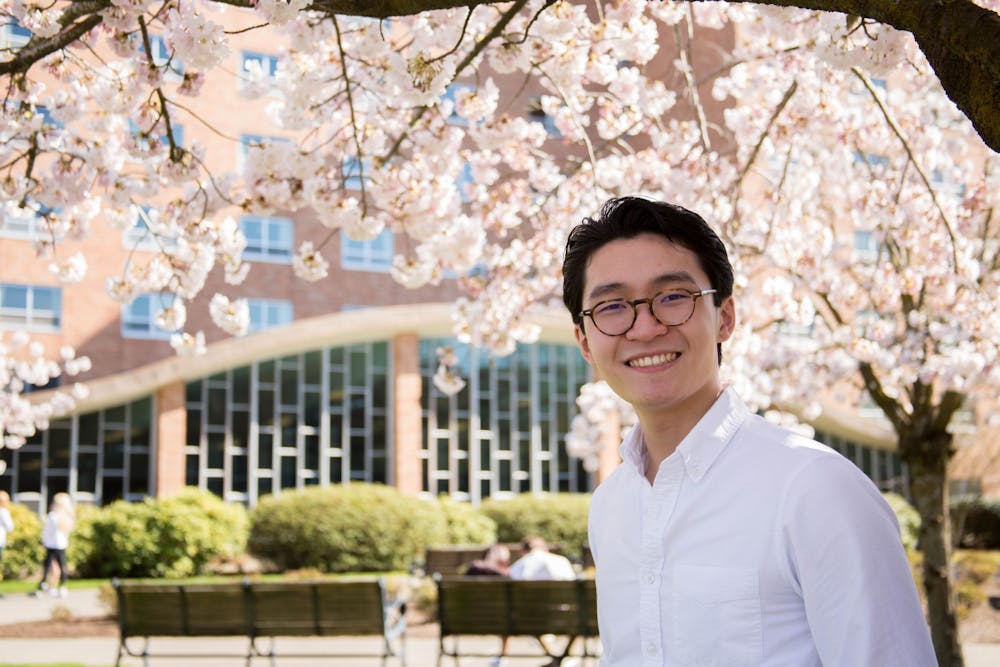
Junior Bao Huynh smiles in front of Mehling Hall.
Submission courtesy of Bao Huynh.
In early February this year, security camera footage from January 31 showing an elderly man being violently pushed into the street in Oakland’s Chinatown went viral. This video shows just one of the many recent attacks against Asian Americans, primarily in California. On January 28, Vichar Ratanapakdee, an 84-year-old Thai man, was attacked in San Francisco and ultimately died from the injuries he sustained. And on March 16, a gunman shot and killed eight people at three different spas in Atlanta. Six of the victims were Asian women.
Asian American-owned businesses have been robbed, Asian Americans have faced verbal and physical abuse, and, as is the case with Wong’s King, Asian American owned restaurants have shut down at shocking rates.
This increase in hate crimes and discrimination against Asian people in America is perhaps received with more surprise than it should be. The myth of the “model minority” perpetuated by white Americans often maintains the misconception that Asian people, particularly east Asian people, do not face racism and discrimination in America. But, since COVID-19 became a pandemic, hate crimes against the Asian American community have drastically spiked -- 1900% in New York, the NYPD reported.
So, what happened to the idea of the “model minority?” It was a myth to begin with -- something that thinly veiled the racism brought to the surface in the past year by harmful racist and xenophobic rhetoric largely bolstered by former President Donald Trump. On numerous occasions, President Trump referred to the coronavirus as the “China virus,” implicating blame for the pandemic on China and Chinese Americans -- blame that has reached the Asian American community as a whole with fatal consequences.

Sophomore Peytynn Kubo smiles in Dundon Berchtold Hall.
Submission courtesy of Peytynn Kubo.
Asian students at UP have felt this impact tremendously. Sophomore Peytynn Kubo, a Japanese American student from Hawaii, reflected on her fears that this violence would reach her own family.
“It's been targeting a lot of the vulnerable, elderly Asian American community, which is something that's just really scary especially since I have grandparents that I'm really close with,” Kubo said. “It’s scary just thinking that it could happen to them, and my father works in California so I definitely worry about him being alone in that state away from home.”
Junior CJ Cabungcal, a Filipino student, shares many of the same fears. Her parents immigrated from the Philippines in the 80s, and both of them are essential workers, meaning they can’t stay within the safety of their home.
“It’s shocking. Violence towards Asian people has always existed, but I think I was just shocked at the lack of humanity behind it,” Cabungcal said. “If my dad went out on the streets of Oakland or San Francisco, and someone wanted to commit a hate crime against him, that is a real possibility.”
Junior Olivia Nomura, who identifies as a biracial Japanese American, also worried about the potential impact of these hate crimes on her family. Being half white, Nomura found herself in a unique position.
“Half of my family does not need to worry at all, and the other half is scared,” Nomura said.
For junior Bao Huynh, a Vietnamese American student, these fears have started to become a reality. He was frightened by the amount of people who came into his mom’s workplace and antagonized the Asian workers there. His dad was also affected.
“My dad and his friends also experienced racism in the form of casual racist remarks towards him,” Huynh said.
Kubo, Cabungcal, Nomura, and Huynh all have been the targets of these microaggressions as well. For Kubo, going to UP was one of the first times she has been put in a predominantly white space. She counts herself as fortunate for never being physically attacked, but the microaggressions she has faced have taken their toll. Nomura has faced similar microaggressions at UP.
“It's like expectations of being smarter, or looking a certain way, so it's like a game of ‘guess which Asian,’” Nomura said. “Because of the way that I look, I'm getting the question of ‘What are you?’”
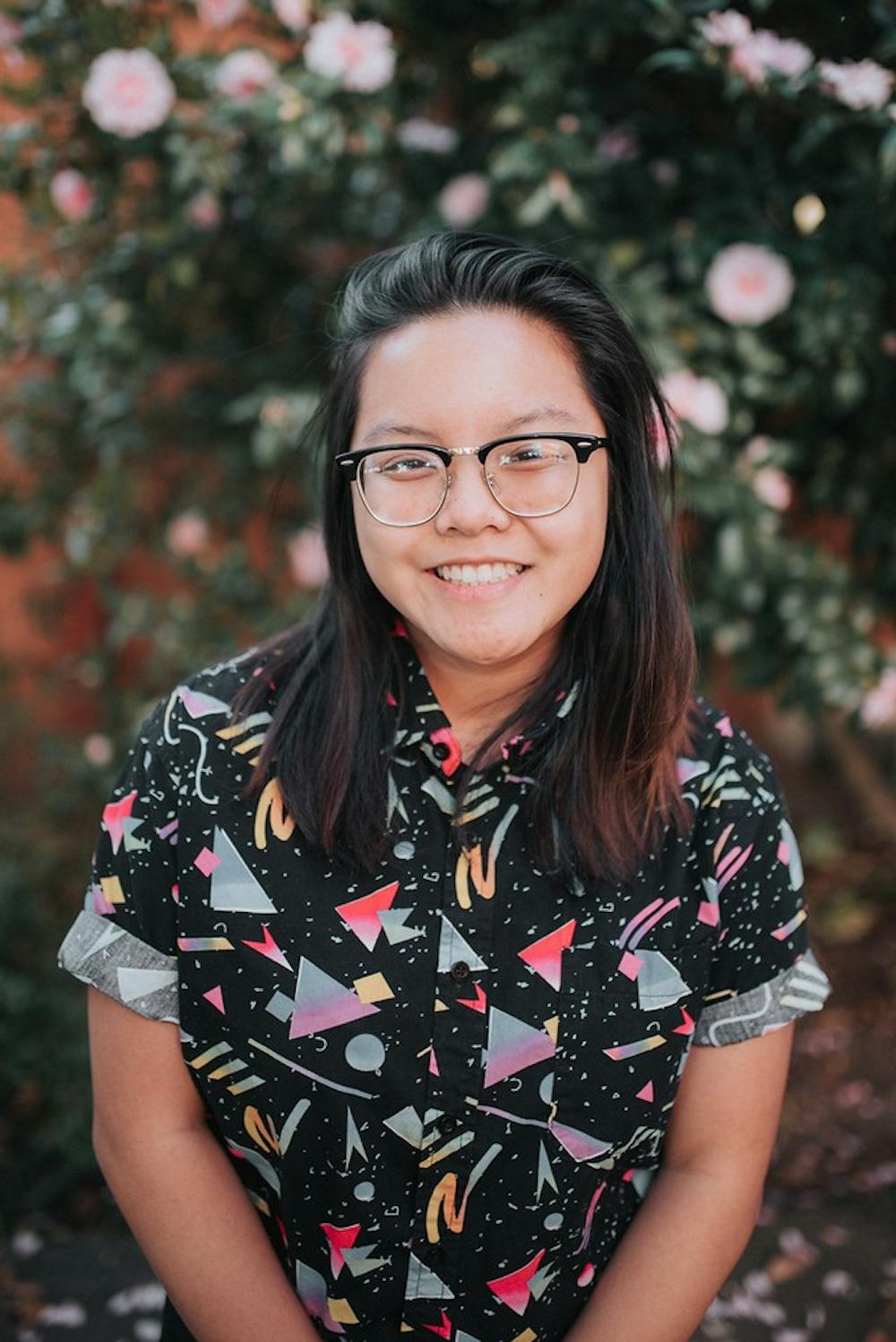
Junior CJ Cabungcal smiles for the camera.
Submission courtesy of CJ Cabungcal.
Cabungcal reflected on the harmful jokes she has heard about COVID-19 and Asian people.
“I went to dinner with an old friend of mine. I said, ‘I'm scared of getting coronavirus’ because my parents are essential workers,” Cabungcal said. “And he said, ‘Oh yeah, because you're Asian right?’”
Nomura and Huynh have also seen the effects of racism against Asian American people in the closures of some of their favorite Asian American-owned restaurants on SE 82nd Street.
“It's been really hard to see all the places important to you growing up going out of business and falling apart because of the stigma,” Nomura said. “You build this community, and you find places where you can eat and it tastes like stuff from home, and now all of the sudden, those places aren't being accepted anymore. And that's really hard.”
In reflecting on the microaggressions they’ve experienced at UP, Cabungcal and Nomura have both been disappointed by UP’s treatment of Asian American faculty, staff, and students.
“It’s disappointing that a college that prides itself on diversity and fostering a community that embraces diversity cannot retain professors of color, or tokenizes them,” Cabungcal said.
“It seems like the university doesn’t want to abandon change, but under the predominantly white leadership, I feel like oftentimes they do not prioritize the wellbeing of staff of color, students of color, faculty of color,” Nomura said. “How are you supposed to understand the cultural experience, or what's wrong with the university, if the majority of the people in those leadership roles are not people of color?”
Kubo also wishes that the university would be more proactive in caring for their Asian American community, especially right now.

Junior Olivia Nomura smiles for the camera.
Submission courtesy of Olivia Nomura.
“I think sharing mental health resources or even educational resources for people who don't identify as Asian American is so important,” Kubo said. “I feel like we shouldn't always have to be the ones to educate others about it -- there's lots of resources to learn more about it and to find out how they can help.”
Cabungcal also emphasized that white students and students with more privilege at the university should consider whether or not their activism is performative.
“If you posted a bunch of random stuff about anti-racism, maybe you should also be talking about Asian hate crimes, because racism is not confined to one summer,” Cabungcal said.
In coping with the added amounts of stress and anxiety due to the increase of these hate crimes, Kubo has found that building a community at UP has been crucial.
“My initial action coming to UP was being able to find that sense of community,” Kubo said. “I joined the Hawaii club, but there was no space for Japanese students, so that's why we created our Japanese club just this past year. So my main piece of advice for other Asian American students is to find that sense of community and create a space for healing.”
These sorts of communities can be found in the Japanese Student Association, Vietnamese Student Association, the Filipino American Student Association, the Mixed Student Union, and more on Engage.
Kubo and Nomura also emphasized the importance of checking in on your peers.
“We're in a time where there's a sort of shared suffering, a shared fear, that's being developed,” Nomura said. “So I think it's so important to try to facilitate those conversations with family members or friends that are most comfortable talking about it.”
But this increase in racism, discrimination, and violent hate crimes targeted at the Asian American community is going to exist as long as the damaging stigmas surrounding COVID-19 continue.
“I don't think you can ever really be secure in a predominantly white institution as a person of color,” Cabungcal said. “I think that you can put a bandaid on these things, but I don't know if that’s security or pushing away a four year anxiety attack.”
For Asian American students experiencing this anxiety, mental health resources can be found here.
Sadie Wuertz is a reporter for The Beacon. She can be reached at wuertz22@up.edu.



